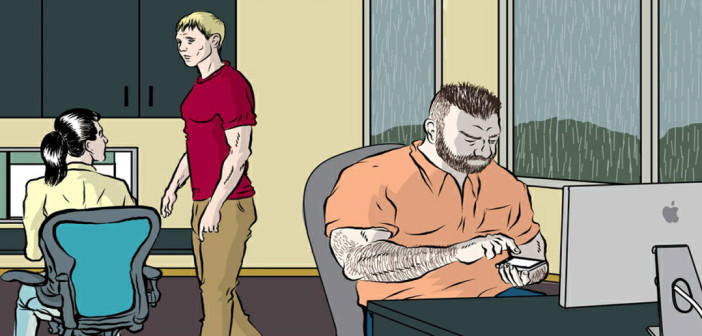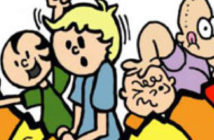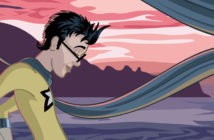In the independent comics scene there are books that are good for the sake of being an independent comic, and then there are the far fewer books that are simply good. The Shirtlifter series by writer and artist Steve MacIsaac isn’t just good — it’s profoundly excellent. MacIsaac belongs to the LGBTQ sector of the indie scene, which is potentially confining to his exposure, but I’m not sure his talent could thrive anywhere else. His work is too powerful as an independent project to be watered down by editorial committees.
I first wrote about MacIsaac’s work about five years ago, and while every word and illustration spoke to me at the time, my life has since undergone a transformation and I now appreciate the stories he’s telling all the more. The series, I suspect, is largely autobiographical (though it is masked with the veil of fiction); it focuses on “bears,” men in the gay community that don’t fit into the stereotype of what homosexual men are perceived to be. Though, as 2015 winds down, I’m not really sure what that stereotype is anymore. Bears are heavier men (sometimes with muscle, sometimes not) that take pride in their beards, shave or buzz their hair short, usually embrace a more basic fashion sense, say “woof” when they’re attracted to other men, and don’t always let their exercise habits dictate their dietary palates.
All of this is touched upon in Shirtlifter, which began in 2006. The most recent volume, featuring the third and final entry of “Unpacking,” was made possible by a Kickstarter campaign. MacIsaac had a goal of $5,000, but earned over $11,000 by the end from the support of 60 contributors. It makes my heart happy that so many believed in an important cultural story like this and more than doubled what was originally hoped for.
Similarly, the web series Where the Bears Are earned over $159,000, when their pledged goal was $150,000. Ian Parks, one of the stars of the series, is personal friends with MacIsaac, and the one who I am guessing gave MacIsaac his guest appearance in the finale of season three. (It’s also worth mentioning that there’s a brief-but-sweet piece of product placement too: Parks is reading Shirtlifter in the same scene.) I guess bears are supportive of their community.
The conclusion of “Unpacking” brings us the current life circumstances of Matt; he is the truest of true bear archetypes. To quote my original review:
The comic chronicles the life of Matt, an ad designer living in Vancouver. He’s out of a recent relationship and has since been on the prowl looking for other men. A physical (and possibly emotional) void is filled when he meets a traveling businessman, even though he’s married and has two children.
My description is pathetically melodramatic. “Unpacking,” like all of the other stories in the Shirtlifter series, is an organic examination of one gay man trying to live his life. There’s a fair amount of clear and unambiguous sex — but there is never sex for sex’s sake. There’s crucial conversation before and after — genuine discourse that calls the decisions of Matt and his married lover into question.
The third installment brings the mutual decisions of these two men into question when married-man Connor mutters the words “I love you” to Matt after sex. There’s fallout, yes, but it’s organic fallout, as there’s a vacuum of action in this issue. Matt had his fun in the first two books (issues three and four of the overall Shirtlifter series), and now in the third he’s left to experience the consequences of being involved with someone who isn’t, never was, and never could be anything significant in his life. And this is commendable in its execution: in the gay community bisexuality is difficult to grasp and everyone comes out on a side in support or opposition to its very existence. MacIsaac handles this topic, along with gay infidelity within a heterosexual marriage (something else that is debated and fetishized in the seedier corners of the gay community ad nauseam) with balanced grace.
As a storyteller, MacIsaac continues with another win. As an artist, he somewhat stumbles. To reference my original review again:
MacIsaac’s work as a cartoonist is exquisitely consistent. His style is reminiscent of an X-rated Charles Burns: he structures his burly characters with an illustrated humanity that makes them nearly tangible. And how the different players in his books incline their heads and position their bodies is uncannily lifelike. This is made possible because of the strict control MacIsaac holds over every single page. Most of his panels are traditionally angular, but others utilize the page through ingenious methods, such as a scene in “Unpacking” where Matt is talking to a friend on the telephone. Matt’s panels are isolated on the upper half of the page, while his friend’s are on the bottom. Their word balloons meet in the middle. And while Shirtlifter isn’t black and white in its current incarnation, most of the stories are not fully colored, either. Instead, MacIsaac uses shades and tones to add a special touch of emotional resonance to his books.
While MacIsaac is still a master of structural control over every panel he creates, the “illustrated humanity” that makes his characters “nearly tangible” is a bit lost. In this issue there were certain panels that reminded me I was reading a comic book because of the sloppy appearance of the characters — especially of Matt in many areas, as he is the primary focus — which is unlike my experience with the first two books, where the consistency was near perfect.
You can’t approach work like Shirtlifter without acknowledging the “porn” factor of the product. But take it from someone who understands the porn industry very well: Shirtlifter is not porn — something I did not understand at the time and pressured MacIsaac to explain in an extensive interview I did with him years ago. It’s erotica, perhaps, but ultimately it’s just real. To paraphrase a statement made by George R.R. Martin concerning sex in his A Song of Ice and Fire novels: the books need to include sex because real people have sex and are motivated by sex. How true, and the same should be applied to Shirtlifter, especially when noting that issue five is almost completely absent of sex and nudity. Why? Because when MacIsaac is writing, sex serves the story and not the reverse.
I cannot recommend Shirtlifter enough — all five issues should serve as a model for creating comics. It’s unfortunate that this series will be missed by so many because of the alienating nature its general subject matter can stir up — but there are so few comic books out there that tell human stories of this quality. For those of us privy, these comics are an absolute joy to read. Please don’t hesitate buying (which you can easily do over at Northwest Press as either a digital or hardcopy) and reading them for yourself: you’ll be richer from the experience.




